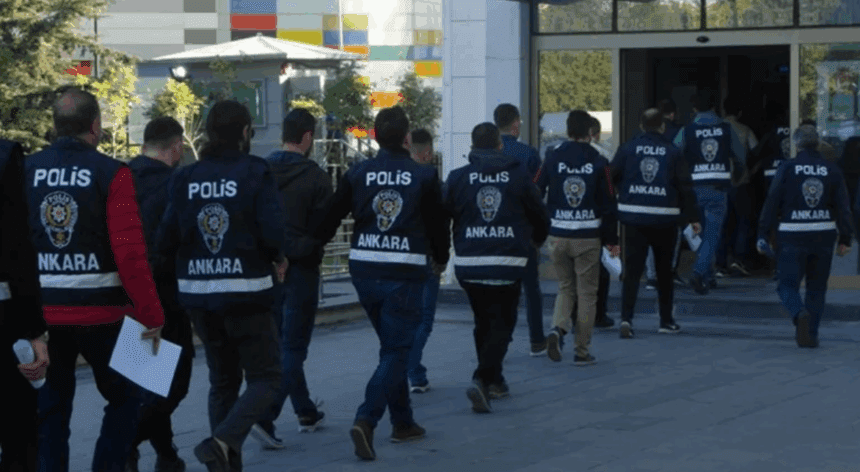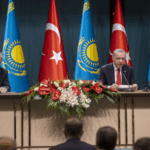Turkey has detained 77 individuals in a new wave of operations targeting followers of the Gülen movement, Interior Minister Ali Yerlikaya announced on Tuesday, signaling that the government’s years-long crackdown on the movement shows no signs of letting up nearly a decade after the 2016 coup attempt. According to Minister Yerlikaya, the detainees are accused of a range of offenses tied to alleged ongoing support for the Gülen movement, including disseminating its messages on social media, making financial contributions to affiliated charities, and maintaining covert communication networks via public payphones.
The arrests, carried out over the past two weeks, spanned 26 provinces, including major urban centers such as İstanbul, Ankara, and İzmir in what has become a relentless pursuit of suspected followers of Fethullah Gülen, the U.S.-based cleric whom the Turkish state accuses of orchestrating the coup. Gülen, who died in Pennsylvania last October, spent years rejecting these allegations, insisting his movement was non-violent and dedicated to education and dialogue.
But the Turkish government sees it differently. Since 2016, it has branded the Gülen network a terrorist organization, dismantling what it calls the movement’s “parallel state structure.” Tuesday’s arrests were announced with familiar justifications: the suspects allegedly maintained ties to the movement, spread its messages online, donated to affiliated charities, and contacted fellow members through public payphones—a method authorities say was used to evade surveillance.
Fifty-six of the 77 people have already been formally arrested, Minister Yerlikaya said in a social media post, and investigations continue into the rest.
The Logic of a Payphone
Among the more controversial elements of the investigation is the “payphone theory.” Prosecutors argue that members of the Gülen movement used payphones to communicate in sequence, forming a clandestine communication chain. If one person is identified, anyone who used the same payphone before or after is automatically added to the list of suspects.
No audio recordings. No physical meetings. Just the call logs.
Critics call it guilt by association. Defense lawyers and rights groups say it’s a stretch of logic that has become a hallmark of the post-coup legal landscape—one where indirect links are often enough to warrant arrest, prosecution, and in many cases, years of imprisonment.
From Partners to Pariahs
The irony is hard to miss for those who remember the early 2000s. The Gülen movement—often referred to as Hizmet, meaning “service”—was once praised by President Erdoğan and his allies. Its schools, charities, and business networks were seen as a valuable soft-power asset, at home and abroad.
But as the movement’s influence grew, so did tensions. By the mid-2010s, what was once an alliance had devolved into an all-out rivalry. After the failed coup attempt in July 2016, the government wasted no time in blaming Gülen and launching what it called a necessary “cleansing” of state institutions.
Tens of thousands were arrested. Hundreds of thousands were investigated. Public servants lost their jobs. Families were shattered. Many fled the country, seeking asylum across Europe and North America.
Today, the Turkish government maintains that the crackdown is essential for national security. But to Gülen’s followers and a growing number of international observers, it looks increasingly like a purge.
The Numbers Behind the Persecution
According to figures released by Turkey’s Ministry of Justice, more than 126,000 people have been convicted for alleged ties to the Gülen movement since 2016. Over 11,000 remain in prison. Legal proceedings are still ongoing for more than 24,000, while another 58,000 are under active investigation—some nearly a decade after the failed coup.
These staggering numbers point to a campaign that shows no signs of slowing down.
Beyond the courtroom, the social cost has been enormous. Teachers, doctors, military officers, and journalists—many with no proven link to the coup—have been swept up in mass trials. Families have been torn apart, children raised without parents, and careers ended without explanation.
A Movement in Exile
While some Gülen supporters still operate quietly inside Turkey, many others now live in exile, scattered across Europe, the U.S., and parts of Africa and Asia. They speak of homes lost, passports revoked, and the daily fear that a knock at the door could mean imprisonment.
Extradition requests have been filed with dozens of countries, with Turkey lobbying for the return of movement members. But most democratic governments have resisted, citing concerns about due process and political motivation.
Still, to many within Hizmet, the crackdown is not about security or justice—it is about silencing dissent and erasing a once-powerful civil society network that dared to rival the state.
The detentions announced this week are a reminder that for Turkey, the coup may be history—but the war it triggered is very much alive. Nine years on, the question lingers: when does accountability cross the line into vengeance? And how long can a nation live in the shadow of its own purge?



